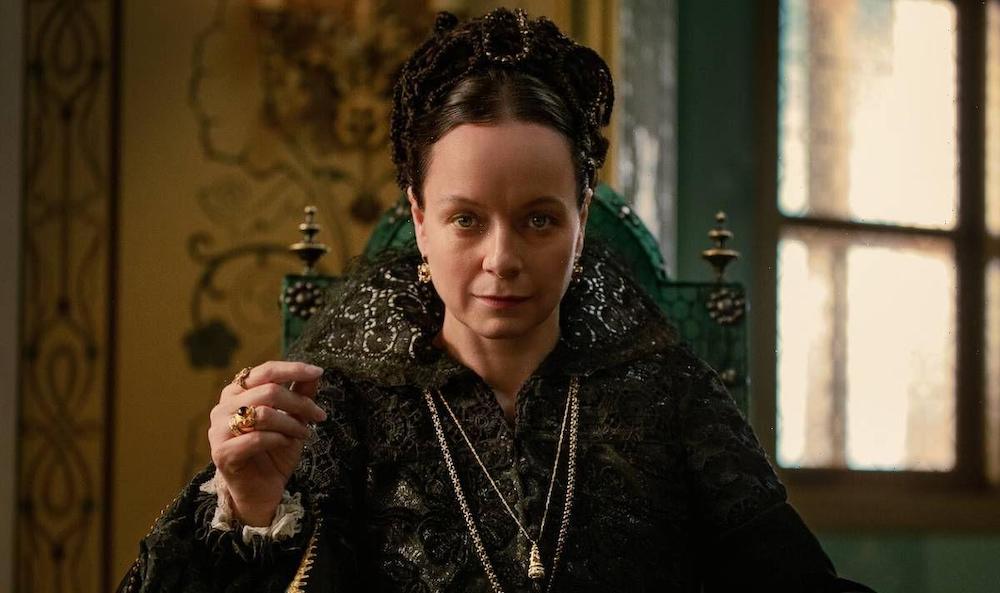Starz is no stranger to ornate, well-costumed historical dramas, as “The White Queen,” “The White Princess,” “The Spanish Princess,” and more can attest. But with “The Serpent Queen,” Starz eyes up the modern flair and pitch-black satire of Hulu’s great “The Great” and covets it for itself. It’s all there in the rippled, torn fabric of the series: modern quips and swears coated in Regency frippery and caked-up makeup, beleaguered women vying for survival in a world run by venal men, anachronistic needle-drops peppered throughout the credits. But the show’s greatest strength is its weakness, as its desire to match style with the devilish, complicated figure at its center leaves it feeling a bit of a pale imitation.
As these kinds of jaundiced takes on European regality go, this edgy approach is well-suited to “The Serpent Queen”’s subject. That subject, of course, is Catherine de Medici, one of the most powerful women of 16th-century Europe—ruling as Queen of France for 15 years, then exerting her influence through numerous sons for the rest of the century. She was as revered as she was feared, a commoner who found her way to the crown through marriage, and defied accusations of the occult throughout her reign to exert power at a time when the world was most especially built for men to occupy.
Justin Haythe (“A Cure for Wellness”), working from Leonie Freida’s nonfiction book “Catherine de Medici: Renaissance Queen of France,” is hardly interested in painting Catherine as a put-upon saint. However, it’s caustically honest about the patriarchal obstacles in front of her. When we first meet her, in a 1590 storyline bookending each episode, she’s a mercurial, feared presence (helps, of course, that she’s played as an adult by Samantha Morton, who’s got the bodice-and-bawdiness game down between this and Hulu’s “Harlots”) whose maids so fear her that an invitation to attend to her feels like a death sentence. And yet, the maid called to serve this time, Rahima (Sennia Nanua), piques Catherine’s interest for one reason or another, and so she tells Rahima her semi-tragic story. It’s an explanation, but it’s also training; she wants Rahima to learn the same lessons about carving out a place for yourself in this mad, man-hungry world.

With this structure set up, much of “The Serpent Queen” flashes us back to the years before, the first three episodes centering on a teenage Catherine (played by Liv Hill) and her sorry entanglement with the throne. While the Medici family had wealth, they lacked royal blood; when her parents both die of syphilis, she’s taken in by Pope Clement VII (played with devilish snark by Charles Dance) and arranged to be wed to Prince Henry II (as a lad, Alex Heath) for the promise of a large dowry. If she can produce heirs, that is.
The problems, punctuated by Morton and Hill’s reptilian asides to the camera, pile up quickly. First, she can’t seem to get pregnant by Henry (Catherine would end up producing ten children, but not after ten years of sterility); second, it would seem Henry is in love with Diane de Poitiers (Ludivine Sagnier), a maternal figure twice his age. Diane and Catherine fast form a rivalry, some of the most compelling bits of the series coming when the two slither about each other’s orbit, trying to find the thing that will bring the other down.
And yet, like the other women in the show, they are united by their shared oppression by the beastly, rude, lewd men around them. Henry hardly rises to the compelling levels of “The Great”’s King Peter—that’s the job of Colm Meaney’s King Francis, who blusters and shouts with compelling pomposity—but his power in the face of such emotional impotence makes him a compelling obstacle for Catherine nonetheless. That both Diane and Catherine must make entreaties for his milquetoast affections, neither of them ceding ground for fear of losing what little status his proximity affords them speaks volumes to “The Serpent Queen”’s take on the pettiness of European court politics.

Unfortunately, when the series strays from Catherine to focus on the internecine conflicts of its supporting cast, “The Serpent Queen” loses momentum. There’s a huge cast of competing forces, whether French, Italian, Catholic, Protestant, or other, and even in the first five episodes provided to critics, it’s a lot to keep straight. Many conflicts feel interchangeable, the politics impenetrable, and the palace intrigue hardly intriguing. The show livens up when Hill (or eventually Morton, as Catherine ages into adulthood in the framing device) struts in to perform her Machiavellian calculations, but until she does, the show can be a bit of a bore.
I can’t help but feel like the show’s winking girlboss-of-the-past approach takes away from “The Serpent Queen”’s strengths, and whether it’d play more effectively as a more straightforward costume drama. As is, Haythe’s modern-inflected script feels like watered-down Tony McNamara dialogue, and the direction (by “Dickinson”’s Stacie Passon and others) can only do so much to capture the claustrophobia Catherine experiences amid her regal trappings. It’d be a more novel approach if another, very recent series hadn’t done it with much greater aplomb and a more venomous bite. But when Morton slinks on screen in her dark gowns and arched eyebrows, it’s easy to lose yourself in her enveloping, constricting grip.
First five episodes screened for review.












